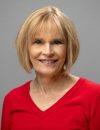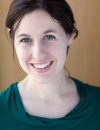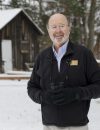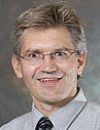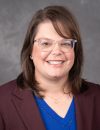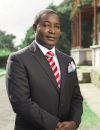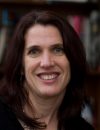-
New York Times
|
September 30, 2020
“Reading these papers gives me the sense that they’re going to have the controlled thermonuclear fusion plasma that we all dream about,” said Cary Forest, a physicist at the University of Wisconsin who is not involved in the project. “But if I were to estimate where they’re going to be, I’d give them a factor of two that I give to all my grad students when they say how long something is going to take.”
-
The New York Times
|
September 30, 2020
“There have been some reports about how viruses are able to manipulate hosts, but this one is so unique,” said Aurelie Rakotondrafara, a plant pathologist at the University of Wisconsin, Madison, who was not involved in the study. “You can’t help but ask: How is this possible?
-
Vox
|
September 30, 2020
Climate change is also tipping the scales toward larger fires. Monica Turner, a fire researcher and a professor of integrative biology at the University of Wisconsin Madison, said in an email that climate is a big driver of megafires, those burning through an area larger than 100,000 acres.
-
New York Times
|
September 30, 2020
Schools can step in and provide support when parents themselves are traumatized. Familiar adults at school can also provide a buffering effect against trauma, said Travis Wright, an associate professor of counseling psychology at the University of Wisconsin-Madison.
-
The New York Times
|
September 29, 2020
“Reading these papers gives me the sense that they’re going to have the controlled thermonuclear fusion plasma that we all dream about,” said Cary Forest, a physicist at the University of Wisconsin who is not involved in the project. “But if I were to estimate where they’re going to be, I’d give them a factor of two that I give to all my grad students when they say how long something is going to take.”
-
The Hill
|
September 25, 2020
Core battlegrounds: A new Franklin & Marshall survey of Pennsylvania put Biden’s lead at 9 points among all registered voters, up from 7 points last month. The race tightens to a 6-point Biden advantage among likely voters. New surveys from the University of Wisconsin-Madison find Biden leading in Michigan (+8), Pennsylvania (+5) and Wisconsin (+5) among registered voters.
-
The Hill
|
September 25, 2020
Biden has led in every major poll of Pennsylvania going back to June and currently leads by an average of 4.1 points. A Franklin & Marshall survey of Pennsylvania released Thursday found Biden ahead by 6 points among likely voters, although a University of Wisconsin-Madison survey found his lead shrink from 9 points to 5 points over the past month.
-
The New York Times
|
September 24, 2020
Though it may seem counterintuitive, large, formal settings are often safer than small, informal ones, because they typically require people to follow stringent rules to minimize risk, said Dr. Arwady.
At school, for instance, “even though the kids are in the classroom, their activities are very much prescribed,” said Dr. Ellen Wald, an infectious disease pediatrician at the University of Wisconsin School of Medicine and Public Health. They are typically required to wear masks and sit at desks spaced six feet apart.
-
The Washington Post
|
September 23, 2020
But it’s an important role for journalists to advocate for public release of as much information as possible, said Kathleen Culver, director of the Center for Journalism Ethics at the University of Wisconsin.
“I have no problem with a reporter telling an author that it’s in the public interest to see that the tapes are released,” Culver said.
-
The New York Times
|
September 23, 2020
But this could be the year that freshwater mussels get the attention that Jordan Richard, a biologist with the U.S. Fish and Wildlife Service and the University of Wisconsin, believes they’re owed.
After years of searching for a potential explanation for the mysterious and massive die-offs that have suddenly killed thousands of mussels in streams from Washington to Virginia, Mr. Richard and his colleagues have finally identified a potential “mussel-bola” culprit.
-
The New York Times
|
September 23, 2020
“If you had to find a part of the country that is an example of white flight, Milwaukee would be a poster child,” said Barry Burden, the director of the Elections Research Center at the University of Wisconsin-Madison.
-
MarketWatch
|
September 22, 2020
But Ryan Owens, a political science professor and director of the University of Wisconsin-Madison’s Tommy G. Thompson Center on Public Leadership, isn’t so sure.
-
Wall Street Journal
|
September 21, 2020
“There’s a lot of suspicion among hard-core Trump supporters, and hard-core Trump opponents, about people trying to manipulate the voting system,” said Barry Burden, a professor of political science at the University of Wisconsin-Madison. “It’s just very tempting for people to believe that something nefarious has happened when the results don’t seem to be going in the way they expected.”
-
Space.com
|
September 21, 2020
“This is something more that we can’t explain about Venus,” Sanjay Limaye, an atmospheric scientist at the University of Wisconsin, Madison, who wasn’t involved in the new study, told Space.com. “Venus has got more questions [about it] than Mars, which is why we are suggesting that Venus should be considered an astrobiology target.”
-
Medical News Today
|
September 21, 2020
Tiffany Green, an assistant professor in the Departments of Population Health Sciences and Obstetrics and Gynecology at the University of Wisconsin-Madison, has pointed out that physical distancing is difficult to achieve in some essential occupations and while using public transport.
-
The New Republic
|
September 21, 2020
Black young adults hold 10.4 percent less wealth, on average, than their white counterparts due to student debt, according to research by Fenaba Addo at the University of Wisconsin-Madison. Black and Latinx borrowers also have higher rates of default than white borrowers, and two in five Native American or Alaska Native borrowers have defaulted on a federal student loan.
-
The Guardian
|
September 21, 2020
Milwaukee is an “essential part” of the coalition any Democrat needs to win a statewide election, said Barry Burden, a professor at the University of Wisconsin-Madison who runs the Elections Research Center. A small change in turnout in the city is more consequential for Democrats than it is for Republicans.
-
LA Times
|
September 21, 2020
With marriage, as with everything else, the justice set a high bar. She tirelessly championed righteous causes and lofty ideals, and also devoted herself to the family she adored. She inspired millions of people she never met and also enriched the lives of those of us who were lucky enough to know her. It is difficult to lose her, especially now. But we know the best way to honor her is to try to live as fully as she did, embracing the values she held dear.
Miriam Seifter and Robert Yablon are associate professors of law at the University of Wisconsin Law School. They clerked for Justice Ruth Bader Ginsburg in 2008-2009.
-
New York Times
|
September 21, 2020
Ryan J. Owens, a political scientist at the University of Wisconsin-Madison and the other author of the study, said its basic conclusion was that “knowing your former boss gives you a leg up.”
“When you clerk for a justice for a year, you come to know how that justice thinks very intimately,” he said. “You know the ins and outs of the justice’s thought processes.”
-
Inside Higher Ed
|
September 21, 2020
Chancellor Blank and Harvard University President Lawrence S. Bacow: If you are leading a college or university right now — or if you are making the academic year possible as a member of the faculty or staff at any one of our nation’s institutions of higher education — asking something more of your students in the midst of a global pandemic may seem impractical. But one assignment cannot wait. We urge you to encourage your students to register to vote, to become informed of the issues and the candidates, and to cast a ballot
-
|
September 18, 2020
Noted: The group will be co-chaired by inaugural members Dr. Tiffany Green, assistant professor in the Departments of Population Health Sciences and Obstetrics & Gynecology at the University of Wisconsin-Madison, and Alia Stevenson, Chief Programs Officer with the Foundation for Black Women’s Wellness.
“The Black Maternal & Child Health Alliance is comprised of Black women serving in important roles in health care, our community, and as decision-makers and knowledge experts. Our highest priority is to ensure that the health and wellbeing of Black mothers remains front and center,” says Co-Chairs Green and Stevenson in a statement. “As the Alliance moves forward, we are pleased to join the Dane County Health Council as we work together to advance the health of Black mothers, babies and their families in this county.”
-
NBC15
|
September 18, 2020
Ajay Sethi, a UW Madison associate professor in population sciences who works on the dashboard, said while universities do not have to report the information, they know it is important to do so.“Dashboards are common, and I think transparency is paramount right now during our pandemic,” he said.
-
MarketWatch
|
September 16, 2020
That’s thanks in part to Fenaba Addo, an associate professor of consumer science at the University of Wisconsin-Madison who studies debt and its role in racial wealth inequality. Addo’s research has shown, among other things, that the gap in student debt held by Black and white borrowers grows by 6.8% each year. As a result, Black young adults hold 10.4% less wealth on average than their white counterparts due to student debt.
-
The Washington Post
|
September 14, 2020
Uncertainty can provoke a vicious cycle of anxiety, says Jack Nitschke, a psychologist at the University of Wisconsin at Madison. “Our brains help us get good at what we’re doing,” he says
-
Los Angeles Times
|
September 14, 2020
“It’s not a fair election system when one side has such a severe election advantage, and it was done intentionally,” said Barry Burden, director of the Elections Research Center at the University of Wisconsin in Madison.
-
Newsweek
|
September 14, 2020
Prof. Barry Burden, director of the Elections Research Center at the University of Wisconsin-Madison, told Newsweek that Mendelsohn’s prediction was unlikely.
-
The New York Times
|
September 14, 2020
“The backers of Jill Stein were young and disaffected from the political system,” said Barry C. Burden, a professor of political science at the University of Wisconsin-Madison. “Typically, minor-party voters are looking for somebody that’s different from what the major parties are offering.” (The Libertarian candidate in 2016, Gary Johnson, received more than 106,000 votes in Wisconsin.)
-
Wisconsin State Journal
|
September 14, 2020
UW-Madison retained its national rank as the 13th-best public college or university in the country, according to this year’s edition of U.S. News & World Report.
-
Nature
|
September 10, 2020
“Everyone is rooting for them to succeed beyond anyone’s expectation, but it’s prudent to think about what happens if they don’t,” says Dave O’Connor, a virologist at the University of Wisconsin–Madison. “We need to make sure we have back-up plans — and back-up plans to those back-up plans.”
-
The Atlantic
|
September 9, 2020
For as long as federal funding for school lunch programs has existed, the labor that makes those meals possible has been low-paid and underappreciated. “A lot of teachers were forming unions in the 1960s and ’70s, but there was a reluctance for cafeteria workers to do the same,” Jennifer Gaddis, a professor at the University of Wisconsin at Madison and author of The Labor of Lunch: Why We Need Real Food and Real Jobs in American Public Schools, told me. “There was this idea that you’re taking money away from free-lunch programs for kids. But historically, there’s never been a lot of national or state-level support within school nutrition, until recently.”

